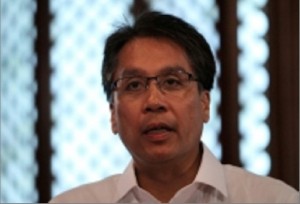MANILA, Philippines – The framework agreement creating the Bangsamoro territory appears to envision a smaller area than the one authorized by its predecessor, the Memorandum Agreement on Ancestral Domain (MOA-AD), but the structural changes it seeks to institute will be felt for many generations, Interior Secretary Manuel “Mar” Roxas II said Sunday.
Roxas, when he was still senator in 2008, vehemently opposed the MOA-AD pushed by then President Gloria Macapagal-Arroyo, which included 735 Muslim majority areas plus a second set of 1,459 villages known as “Special Intervention Areas.”
Section 5 of the new “Framework Agreement on the Bangsamoro” says that the core territory of the Bangsamoro shall be composed of:
. Present geographical area of the Autonomous Region of Muslim Mindanao (ARMM).
. Municipalities of Baloi, Munai, Nunungan, Pantar, Tagoloan and Tangkal in the province of Lanao del Norte, and all other barangays in the Municipalities of Kabacan, Carmen, Aleosan, Pigkawayan, Pikit, and Midsayap that voted for inclusion in the ARMM during the 2001 plebiscite.
. Cities of Cotabato and Isabela.
. All other contiguous areas where there is a resolution of the local government unit or a petition of at least 10 percent of the qualified voters in the area asking for their inclusion at least two months prior to the conduct of the ratification of the Bangsamoro Basic Law and the process of delimitation of the Bangsamoro as mentioned in the next paragraph.
In an interview with the Philippines Daily Inquirer, Roxas elaborated on the differences between the new agreement and the old MOA-AD, which was scrapped by the high court for being unconstitutional because of lack of consultation with affected residents.
“First, this (process) is transparent. Second, this will pass through Congress—both in the House and Senate. And after this, the people will be asked through a plebiscite,” said Roxas.
“This will not be compulsory, and is aligned with the President’s principle that ‘you are the Boss.’ The people will be the ones to decide through a plebiscite,” said Roxas.
Roxas stayed with the President in Malacañang until 3 a.m. Sunday to finalize the draft accord.
He expected the agreement to lead to “substantive, structural changes” with the effects of this process to be felt in generations to come.
He noted that the 40-year secessionist struggle had bred extreme poverty and underdevelopment of the war-torn region.
“This is huge, historic. This is not just temporary, but generational,” said Roxas, echoing the President’s desire to have the same social services, level of education and health facilities available in the rest of the country to be enjoyed as well by residents of impoverished provinces in Mindanao.
